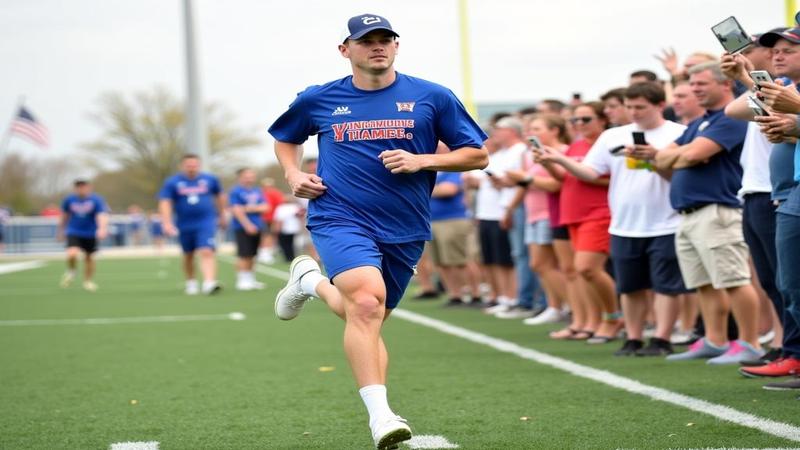Mac McWilliams on the Fast Track as Eagles-Jets Snap Counts Go Pro

On a day when stadium PA systems sounded more like a metronome than a public address, the Eagles and the Jets turned snap counts into a spectator sport. The crowd roared as the shift from ‘one’ to ‘two’ to the famous third-down pause became the highlight reel, with Mac McWilliams somehow leading the charge from the bench like a caffeine-fueled cheetah. In a league where every twitch of the play clock is analyzed, today’s incident was less football and more speed science.
Coaches insisted the real story wasn’t who started, but how many times the ball changed hands before the ball even left the quarterback’s grip. The play-by-play announcer sounded like a syncopated drumline as helmets clacked and the snap counts climbed higher than the concession prices at the stadium. The field wore a grin stemming from the crowd’s collective astonishment.
Mac McWilliams’s name appeared more times in the glossy stat sheets than in the team’s depth chart, which is to say, it appeared a lot. Analysts whispered that he was on the ‘fast track’—a phrase that now sounds suspiciously like a treadmill with a quarterback attached. The team swore it’s not a referendum on his talent; it’s a referendum on his ability to avoid offside penalties during overtime.
Meanwhile, Jets coaches played it cool, claiming they were ‘playing the long game’ and that the sprint to possibility was more of a mirage than a plan. The speed metric, they insisted, was nothing more than a clever marketing umbrella for a game that tends to go long enough for a nap. The press, hungry for drama, immediately flagged this as a blockbuster in running shoes.
Fans started debating whether McWilliams would ever crack the starting lineup or merely set the world record for ‘most people cheering while watching a single guard pull.’ The snapping itself became the real star, with referees whistling in Morse code like a vintage science experiment. Even the mascot wore a stopwatch necklace, as if time itself deserved a jersey.
Team officials tried to frame the moment as a measured experiment rather than a soap opera, insisting that every lean toward the sideline was data, not drama. The fanbase, meanwhile, treated every down as a potential audition for a reality show called ‘Snap, Crackle, Pop Pass.’ The scoreboard, meanwhile, looked like a mood ring for fans who like their football well-timed.
Sportwriters draft scavenger-hunt headlines in search of the next twist, only to discover the twist was the clock all along. The NFL’s analytics team spoke in jargon about ‘tempo variance’ and ‘snap cadence optimization’ as if they were describing a new yoga pose. If there was a moral to this, it was that speed wins, but timing wins the season.
To keep up with the spectacle, McWilliams’s routine now includes what the staff calls ‘quantified acceleration’ and a likely future fashion trend: a ‘personal cooling vest’ to survive the sprint. The equipment manager swears it’s not a gimmick, just a necessary accessory for fans who expect a data-driven victory lap. For now, the vest is being hailed as the season’s must-have disutility because nothing says ‘on pace’ like wearing a personal breeze inside a firestorm.
Photos of McWilliams sprinting through cones circulated on social media, captioned with ‘tempo unmatched since the invention of the huddle.’ The coaching staff insisted the expression on his face was ‘focus, not fumes’—which, privately, is exactly what they call a panic button in the playbook. Fans debate whether the sprint was genius or a high-speed audition for a reality show.
Analysts compiled a highlight reel that looked less like football and more like a speed-dating event, with teams trying to match times to each route. The Jets’ defense responded with bravado that was equal parts theater and weather forecast, promising ‘sunny with a chance of snap’ for the rest of the season. Someone in the press room asked if the clock was broken or merely experiencing a case of the Mondays.
Meanwhile, the Eagles’ gadget department unveiled a line of neon yard markers that glow when someone advances a single inch. If the team ever wins a trophy, it will probably be because the trophy light up reads ‘Tempo Hero’. The players nodded as if this was the most efficient path to victory, which, in their defense, is exactly what the clock wants to hear.

By week’s end, the push to make McWilliams the starter had grown louder than a stadium nacho vendor, and the team rolled out merch branded with a ‘Fast Track Club’ graphic that doubles as a fan cooling device—a ‘portable stadium seat cooler’.
Some players whispered that the whole thing is a trial balloon for a new broadcasting concept: ‘fast-forward football’ where the clock speed matches the fan’s coffee intake. Coaches laughed and said the only thing faster than McWilliams is the rumor mill, which has its own power rating at this point. The stadium’s press box, meanwhile, started keeping a separate time zone just for him.
Defensive coordinators admitted they’ve never seen someone both accelerate and stall the moment the ball is snapped, all at once. The crowd swayed with the rhythm of the tempo, like a synchronized swimming team that forgot splashy costumes. The Jets’ bench congruently nodded, as if to say, ‘we’ll take the frostiest challenge you bring’.
Parody of the season: reporters ask McWilliams about his dreams; he says, ‘to be on the field,’ and the crowd responds with a chorus of ‘two seconds, please’ as if timing was a sacred rite. The interview devolves into a countdown that may as well be a starting pistol for a library. Journalists file stories that read like horoscopes for touch-and-go careers.
An unnamed league insider told reporters that the actual starting decision will be made by the amount of popcorn eaten during the halftime show.
Coaches keep repeating: ‘It’s not a sprint, it’s a marathon with a few sprints thrown in for good measure.’ The public remains enthralled by the geometry of his routes and the sound design of the whistle. Somewhere, a stat sheet begins to resemble a modern art sculpture.
Opponent teams are studying the tape with the zeal of archaeologists examining a fossil. They have labeled one frame ‘The Moment of Relentless Acceleration’ and asked whether McWilliams’s legs came with their own metric system. The media’s golden headline? ‘Fast Lane, Slow Start,’ a paradox that somehow sells magazines.
Video analysts have created a ‘tempo meter’ that looks suspiciously like a kitchen timer. The team insists it’s a legitimate tool, even as the clock ticks Sherlock-Holmes-soft toward the next play. Fans start to wonder if the meter will replace the scoreboard entirely.
Even the water cooler has opinions, its ice cubes clinking in applause every time McWilliams hits the line. The maintenance crew jokes that the arena runs on applause and anxiety, with a dash of lemon for flavor. Somewhere, a intern writes the headline: ‘Speed Pays, But Your Moment Is Short’.
At the postgame press conference, McWilliams joked that his speed is a public service: ‘I’m here to help you see the scoreboard in real time.’ The room laughed, then checked their watches to confirm the time of the next press deadline. The head coach reminded everyone this is a marathon, not a sprint, even if the sprint is a very fast one.
With the season still early, the league teases another chapter: ‘Snap Counts: The Remix’ featuring a longer cut, more dramatic music, and perhaps a cameo by that cooling gear everyone suddenly wants.
